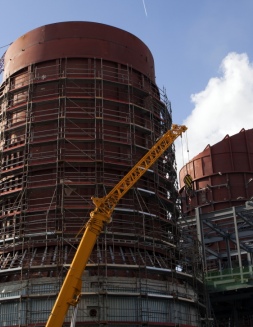Imperial developing better construction methods for nuclear power plants
by Colin Smith

New methods for building nuclear reactors from preassembled parts is the focus of a new academic and industrial collaboration.
Researchers from Imperial College London in partnership with engineering firms Laing O’Rourke and ARUP along with the BRE will optimise the design, manufacture and assembly of components for nuclear power plants as part of a wider Government strategy to boost activity in the construction sector and make the UK a global leader in the lucrative nuclear power plant construction industry.
By 2030, it is forecast that globally there will be £930 billion invested in building new reactors, which could generate up to 40,000 jobs in the UK. A further £250 billion will be spent on decommissioning older reactors.
Professor Washington Ochieng, from the Department of Civil and Environmental Engineering, is the co-investigator on the project. He says:
“Nuclear power is a vital source of clean energy for many countries such as Japan, France and the UK. However, many of the nuclear plants that currently supply us with power are aging and due to be decommissioned. The UK Government recognises that this represents a great opportunity for engineering firms and academic institutions to work together and reassess how these facilities are designed and constructed. Any innovations in this area could give the UK construction sector a competitive edge, which is especially important in this tough global economic environment. We are really excited about our project because it could lead to a radical shake-up in how nuclear plants are designed and built.”

The aim of the project is to develop methods so that pre-assembled parts can be used to build new reactors - saving time and money
The project team will investigate new methods for manufacturing large reinforced concrete components for nuclear plants, to be re-assembled onsite. The researchers will carry out tests to check the reliability of these components and ensure that they meet the stringent design, assembly and safety guidelines required in power plant construction.
Dr Panagiotis Angeloudis, from the Department of Civil and Environmental Engineering, is the Imperial academic leading on the project. He says:
“Imperial is a world leader in developing the best and most innovative methods for automating cargo handling in a variety of settings. We will apply these skills in this project to inform the design and assembly of prefabricated components in nuclear construction. This will enable the industry to rethink and streamline the entire design and assembly process in nuclear plant construction and beyond.”
The construction industry accounts for approximately seven percent of UK GDP, improving efficiency and productivity levels in this sector via these new methods, say the researchers, will further support the UK economy and promote greater competitiveness in the sector.
Faster construction processes could also have positive environmental consequences because assembling prefabricated components onsite could reduce the impact that construction sites have on surrounding areas. Other environmental benefits could include reducing the level of harmful emissions generated during construction, creating less waste and lowering of noise levels.
Ultimately, this project could lead to lower energy costs for consumers because upfront investment costs to build a power plant could be reduced through faster and more efficient construction methods.
The £1.7 million project, funded by the Technology Strategy Board, industry and the Engineering and Physical Sciences Council will run for three years.
Article supporters
Article text (excluding photos or graphics) © Imperial College London.
Photos and graphics subject to third party copyright used with permission or © Imperial College London.
Reporter
Colin Smith
Communications and Public Affairs